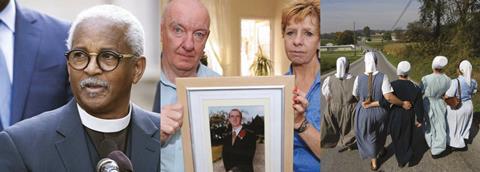Letting go of past hurts can be one of the hardest decisions you ever make. But it’s always worth it, says Claire Musters
The concept of forgiveness is one we know well as Christians but, in recent years, wider society has also been waking up to its potential to improve mental and physical wellbeing. Several studies now reveal that forgiveness reduces anxiety, stress and depression, lowers blood pressure, improves heart health and strengthens the immune system.
In his Sermon on the Mount, Jesus taught: “Forgive, and you will be forgiven” (Luke 6:37), and when Peter asked whether he should forgive someone seven times (the number of perfection) rather than three times (as the Jewish rabbis taught), Jesus responded: “I tell you, not seven times, but seventy-seven times” (Matthew 18:21-22). He then told the parable of the unforgiving debtor, explaining that we should forgive generously because we have been forgiven so much.
Considering the research and Jesus’ teaching, why then do we still find forgiveness so difficult? Perhaps because harbouring a grudge and wanting revenge are natural human responses. When a stranger hurts us or our family and shows no remorse, it can be excruciating to release them from our anger. When a person betrays our trust, it can be difficult to let go of the pain. What do we do when forgiveness goes from being a biblical principle to a personal dilemma?
Defining forgiveness
The idea of forgiving another, even if they don’t seem sorry for what they have done, can be hard to swallow. In fact, as Tim Keller detailed in his last book Forgive (Hodder & Stoughton), modern-day culture has a problem with forgiveness, seeing it as an “Abrahamic culturally-ingrained guilt trip” that can be used by institutions and abusers to avoid accountability. The killing of George Floyd and the #MeToo movement sparked heated discussions about how the call to forgiveness can be twisted to ensure white, male supremacy. Many see it as outdated and unnecessary.
But this may be perpetuated by the misunderstanding that to forgive means glossing over, excusing, condoning or denying the seriousness of an offence. Right through scripture, we see that while God extended forgiveness and care, he did not approve of sin – and there were always consequences for it.
Sadly, teaching on forgiveness in churches can sometimes push a ‘tidy’ solution: we must forget what has been done and reconcile with the person who wronged us. But while forgiveness may repair a damaged relationship, and the Bible does talk about reconciliation (Matthew 5:23-24), there are some instances when it would be extremely unwise to do so. Even when reconciliation happens, it can take time for trust to be rebuilt. And forgiving someone does not mean dropping the legal pursuit of justice either.
Claudine Roberts, author of Cover to Cover: Violence Against Women (Waverley Abbey Resources), says: “Reconciliation is the restoration of healthy relationship. Many relationships of abuse have never been healthy – there has always been an abuser and a victim – so reconciliation is often impossible. It can be extremely dangerous for a female victim of domestic abuse to have any contact at all with her abuser after leaving the relationship – statistics show there is a huge rise in the likelihood of violence after separation.
“Reconciliation is not a necessary part of forgiveness. Sometimes restoration is about cutting all ties with the abuser and forgiveness is about safely wishing them well from a distance. For me, this has meant praying sincerely for my abuser’s salvation. Any contact with him would have opened me up to further abuse.”
The cost of unforgiveness
Too often, we can wrestle with the idea of forgiving someone because we have believed a skewed version of what forgiveness means. But we struggle, too, when we don’t feel the person deserves our forgiveness. And yet it is important to reflect on who is impacted when we hold on to bitterness, anger and other negative emotions.
In Something You Once Knew (Form) Joshua Luke Smith makes a powerful point about unforgiveness: “It will cost you to become someone who’s tormented inside, someone who sees the face of the perpetrator on everybody else because you never released them.”
Viewed this way, we can see that holding on to unforgiveness means trapping ourselves. To forgive releases us to acknowledge and let go of the pain, in order to receive healing.
I realised I was hurting myself when I refused to forgive
This is a process that usually takes time. We may have instances where our minds are flooded with memories of the wrongdoing. When this happens, forgiveness is a daily choice.
I faced this myself at a particularly difficult moment in my marriage. I found myself desperately needing forgiveness, but finding it hard to extend it to those who had hurt me most. I had caused a huge amount of pain, but I was locked in a prison of bitterness.
Due to a deep sense of loneliness in the early years of my marriage, I became close to a mutual friend. When he said he was leaving his wife and asked me to join him, I agreed. Two weeks later, he felt convicted by God to return to his wife. I was left alone and heartbroken. During the next three months before my husband and I reconciled, I walked an intense journey of forgiveness – towards the other man, my husband…and myself.
3 stories of forgiveness

Rev Anthony Thompson’s wife, Myra, was leading a Bible study at Emanuel African Methodist Episcopal Church, Charlestown, in June 2015, when Dylann Roof opened fire, shouting hateful racial slurs. Rev Thompson went to Roof’s court hearing not wishing to speak but, when God whispered to him that he had something to say, Thompson obeyed and found himself saying: “I forgive you. My family forgives you.” Afterwards, he said: “He took away the anger and hate – he just took it all away. It was gone. So I know that forgiveness heals.” Read the full story here
Ray and Vi Donovan’s sons, Christopher and Philip, were on a night out in Ewell, Surrey in 2001 when they were attacked by a gang. Christopher, 18, died of his injuries. Three of the 14 gang members were charged with murder. Ray and Vi wrote to each of the boys and eventually met them in person, offering their forgiveness. They say they could not have done so without their faith in the restorative justice of the cross. Today, their charity, the Chris Donovan Trust, aims to educate prisoners and young people on the impact of violent crime.
The Amish community in Nickel Mines, Pennsylvania, was attacked by gunman, Carl Roberts, in 2006. Roberts entered their schoolhouse and shot ten children, killing five, before turning the gun on himself. Within hours, members of the community visited his family, expressing sorrow for their loss and extending forgiveness. Many couldn’t understand their response, but the Amish’s core values rejects revenge outright. They exercised forgiveness by reaching out with empathy and compassion, following Jesus’ example, as well as that of the early Church (see Matthew 5:39,44, Romans 12:19-20, 1 Peter 2:23-24; 3:9).
My husband, Steve, revealed the love of Jesus to me in a way I had never seen or experienced before but, as he says in our book Grace-filled Marriage (Authentic Media), he could only do that because of a revelation God gave him through Francine Rivers’ novel Redeeming Love (Lion), which was based on the book of Hosea. It was a daily choice for him, however, and he admits that he sometimes questioned whether I was truly sorry for my actions or deserved his forgiveness.
A lot of mistakes had been made on both sides, and I needed to forgive Steve for the hurt he had caused me, too. I was also reeling from the fact that the other man had simply gone back to his wife. I couldn’t stomach the fact that he seemed to have dodged any consequences for his actions.
Reconciliation is not a necessary part of forgiveness
It was when I read RT Kendall’s book Total Forgiveness (Hodder & Stoughton) that I finally began to break free from my prison. In it, he spoke honestly about the wrestling I was experiencing in my own heart. I began to realise that I was hurting myself when I refused to extend forgiveness. I started to understand that forgiveness is not about approving, excusing or denying what had been done. When I made the conscious effort to forgive – which was incredibly painful – I sometimes experienced God’s peace, but not always.
It was a long journey. Wrapped up in self-pity, it took me a long time to fully appreciate the depth of my own sin. But, when I did, I needed to forgive myself. Sometimes we feel we don’t deserve forgiveness, or self-righteousness tells us that we are somehow being virtuous by withholding forgiveness. But when we truly repent of wrongdoing, we are cleansed by Jesus’ blood (1 John 1:9). By not forgiving ourselves, we are unnecessarily holding on to guilt. Our enemy might like to remind us of our shortcomings, but we can learn not to listen and draw closer to God rather than shrink away.
The help of the Holy Spirit
The cross provides both the justice and means of our forgiveness. We cannot earn God’s forgiveness – a concept we might struggle with if we are used to striving – but receiving it is life-transforming. As Jesus stated in Luke 7:47 when forgiving the sins of the woman who anointed his feet: “her many sins have been forgiven – as her great love has shown. But whoever has been forgiven little loves little.”
In Ephesians 4:32, Paul wrote: “Be kind and compassionate to one another, forgiving each other, just as in Christ God forgave you.” The point is that we have been forgiven so much by God. Scientists and psychologists are promoting the benefits of forgiveness, but their emphasis is very much on personal effort. Learning to forgive is something we do with the help of the Holy Spirit. As Rev Thompson (see box, left) says: “It takes God to help you to forgive, even if you want to – you can’t do it on your own.”
Ultimately, forgiveness is an issue of the heart and soul. It may be one of the hardest things we are called to do as Christians, but we can lean on the help of the Holy Spirit as we learn to do so.







































No comments yet